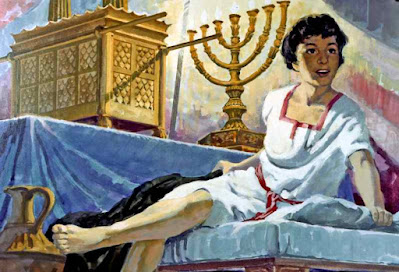There is a key detail about the first reading
that occurs in the verses just before what we heard today.
Moses warns the people: don’t go after soothsayers,
don’t conjure up ghosts. You don’t need to do that.
Rather, Moses said, God will give you a prophet.
This is a very important principle underneath our entire Catholic Faith.
So simple that people miss it. But it changes everything. And it is this:
Our God is on our side.
You and I don’t have to find some magic code to unlock his secrets.
God wants to reveal himself. And he has!
He not only wants to light up the path for us, he already has!
Jesus says, in another passage, “I am the way.”
You and I don’t slash our way through a dangerous forest.
No: we are given a big, beautiful highway, well lit, well marked.
Stay on it, all the way to heaven.
Not only need we not consult fortune-teller,
You and I absolutely must not do that.
Why not?
Well, first, since God says he doesn’t talk to us that way,
Then if you try to “dial up” God through a séance,
then who are you really talking to?
You could be messing with spiritual evil.
Notice how Jesus handles demons. He doesn’t chat. He silences them!
The devil is a liar. Why would anyone want to seek his advice?
The second reason we don’t mess with horoscopes
is because of what we’re truly trying to do:
which is to manipulate God.
There’s an ego thing here.
We humans don’t want to be told to wait, or be patient,
To be left out of the “inside story.”
That’s why people love gossip. And why we spread it,
so people will think we’re wired-in.
And that does so much damage.
You know works better, but we never want to say:
“I’m not that important; I don’t know anything!”
But Moses’ point – God’s point –
is that you and I truly on the “inside” to the extent we need to be.
We’ll get all we need.
So: Moses promised us prophets, and the final fulfillment of that
is Jesus Christ, who is not merely “from” God, he IS God!
But here’s how we go to the next level.
You and I aren’t merely along for the ride.
Jesus puts you and me to work in his prophetic ministry.
When you and I were baptized, we became part of Jesus,
and therefore, we share in his prophetic authority,
his kingly and his priestly authority. What does that mean?
Well, in the second reading, Paul explains
that even whether you or I get married, or remain unmarried,
is part of this prophetic task.
Sometimes we want to have it both ways.
When someone else is deciding, you or I might get our back up,
and insist on telling that person how to do it.
But then, if the one in charge says, OK, can you help with this?
Some people say yes, but others will back away and say
“oh no, that’s not my job!”
Jesus includes you and me in the whole project.
We really are “insiders.” You want to be a prophet?
Learn your faith, and be ready to share it.
Moses told us the true prophet says what God says.
So if you and I want to be true prophets,
we unite our message with what God speaks
through the Body of Christ, the Church.
Jesus gave his prophetic authority to the Church as a whole.
And if you haven’t figured it out, let me connect the dots.
The “Beacons of Light” project underway in our parishes,
together under the patronage of Saint John Paul,
is about being – together – a prophet to our community.
That’s what Archbishop Schnurr means when he keeps saying,
and I say it too: we are going to focus on evangelization,
more and more and more.
You and I, and everyone, from age 1 to age 101 and beyond,
must get out of the mindset that we’re just…”absorbing.”
We’re just along for the ride. No!
There’s urgent business of saving souls and changing lives.
Jesus is on the move, and we’re moving with him.
There’s work to be done,
and everyone, without exception, has a part to play.

























